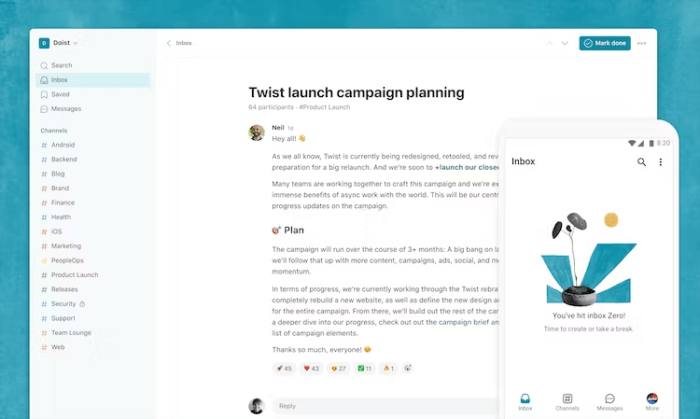Best Business Messaging Apps in 2024: A Guide for Small Businesses
Finding the right business messaging app can feel like searching for a needle in a haystack. With so many options available, it’s easy to get overwhelmed. But don’t worry! This guide will help you navigate the world of business communication apps and find the perfect fit for your needs. We’ll explore the features, pricing, and pros and cons of several top contenders, making your decision-making process much smoother.
Keywords: business messaging apps, best business communication apps, small business communication, team communication apps, messaging apps for work, secure messaging apps, affordable business messaging, top messaging apps for business, business chat apps, efficient communication tools.
Understanding Your Needs: What to Look For
Before diving into specific apps, let’s identify your key requirements. What are your primary communication needs? Do you need a simple platform for quick messages, or something more comprehensive with features like file sharing, video conferencing, and task management? Consider the following factors:
- Team Size: Are you a small team or a larger organization? Some apps scale better than others.
- Budget: Pricing models vary widely. Some offer free plans with limitations, while others require paid subscriptions.
- Integration: Does your business use other software like CRM or project management tools? Seamless integration is crucial for efficiency.
- Security: Protecting sensitive business information is paramount. Look for apps with robust security features like end-to-end encryption.
- Features: Consider the features you need, such as group chats, file sharing, voice and video calls, and integration with other platforms.

Top Business Messaging Apps Compared
Now, let’s delve into some of the leading business messaging apps. We’ll break them down based on their features, pricing, and overall suitability for different business needs.
| App Name | Key Features | Pricing Model | Pros | Cons | Best For |
|---|---|---|---|---|---|
| Slack | Channels, file sharing, integrations, video calls | Free (limited), paid plans | Excellent organization, robust features, extensive integrations | Can be overwhelming for small teams, free plan has limitations | Larger teams, complex workflows |
| Microsoft Teams | Channels, file sharing, video calls, Office 365 integration | Included with Microsoft 365 | Seamless integration with Office 365, widely used, reliable | Can be resource-intensive, may require a Microsoft 365 subscription | Businesses already using Microsoft 365 |
| Google Chat | Channels, file sharing, Google Workspace integration | Included with Google Workspace | Simple, intuitive interface, integrates well with other Google apps | Fewer features than Slack or Teams, less robust integrations | Smaller teams, businesses using Google Workspace |
| WhatsApp Business | Individual and group chats, file sharing, business tools | Free | Widely used, simple interface, good for customer communication | Lacks advanced features like channels and extensive integrations | Small businesses, customer communication |
| Telegram | Channels, file sharing, self-destructing messages | Free | Fast, secure, cross-platform support, large file sharing capabilities | Less integration with other business tools | Businesses needing strong security and large file sharing |
Keywords for this section: Slack, Microsoft Teams, Google Chat, WhatsApp Business, Telegram, business messaging app comparison, messaging app features, pricing comparison, best business chat app.
Deep Dive into Popular Choices
Let’s take a closer look at some of these apps in more detail.
Slack: Slack stands out for its channel-based organization. This allows for focused conversations within different projects or teams, keeping things tidy and efficient. Its extensive integrations with other business tools make it a powerful hub for collaboration. However, its interface might feel overwhelming for smaller teams, and the free plan has limitations on message history and app integrations.
Microsoft Teams: If your business already uses Microsoft 365, Teams is a natural choice. Its seamless integration with other Office 365 apps makes it incredibly convenient. It offers robust features for video conferencing, file sharing, and chat, making it suitable for both small and larger teams. However, it can be resource-intensive, and you’ll need a Microsoft 365 subscription to access its full capabilities.
Google Chat: Google Chat offers a simpler, more streamlined experience compared to Slack or Teams. Its integration with other Google Workspace apps is a significant advantage for businesses already using Google’s ecosystem. It’s a great option for smaller teams that need a straightforward and user-friendly communication tool. However, it might lack some of the advanced features and integrations found in other apps.
WhatsApp Business: WhatsApp Business is specifically designed for customer communication. Its ease of use and widespread adoption make it a popular choice for small businesses interacting directly with clients. However, it lacks many of the features found in dedicated business messaging apps, such as channels and advanced integrations.
Telegram: Telegram shines with its speed, security, and large file-sharing capabilities. Its self-destructing message feature appeals to those prioritizing privacy. However, its integration with other business tools is less extensive than other options on this list.
Keywords for this section: Slack review, Microsoft Teams review, Google Chat review, WhatsApp Business review, Telegram review, business messaging app features comparison, choosing the right business messaging app.
Beyond the Basics: Advanced Features to Consider
Many business messaging apps offer advanced features that can significantly boost your team’s productivity. These include:
- Task Management: Some apps integrate task management tools, allowing you to assign and track tasks directly within the messaging platform.
- File Sharing and Collaboration: Look for apps that offer seamless file sharing and collaborative editing capabilities.
- Video Conferencing: Integrated video conferencing is crucial for remote teams and client meetings.
- Integrations: Seamless integration with other business tools is essential for efficient workflows.
- Security and Privacy: Ensure the app offers robust security features, such as end-to-end encryption.
Choosing the Right App for Your Business
Selecting the best business messaging app depends entirely on your specific needs and preferences. Consider the size of your team, your budget, the features you require, and the level of integration you need with other software. Don’t be afraid to try out free plans or trial versions before committing to a paid subscription.
Keywords for this section: advanced business messaging features, task management in messaging apps, file sharing and collaboration tools, video conferencing in business messaging, app integrations, business messaging app security.
| Feature | Slack | Microsoft Teams | Google Chat | WhatsApp Business | Telegram |
|---|---|---|---|---|---|
| Channel Organization | Excellent | Good | Good | Poor | Good |
| File Sharing | Excellent | Excellent | Good | Good | Excellent |
| Video Conferencing | Excellent | Excellent | Good | Poor | Good |
| Integrations | Excellent | Excellent | Good | Poor | Fair |
| Security | Good | Good | Good | Good | Excellent |
| Pricing | Paid/Free | Paid/Free | Paid/Free | Free | Free |
Keywords for this section: business messaging app feature matrix, business communication app comparison table, messaging app selection guide.
Conclusion
The best business messaging app for you will depend on your unique circumstances. Weigh your needs carefully, considering factors like team size, budget, required features, and integration capabilities. Don’t hesitate to explore free trials or free versions of the apps before committing to a paid plan. Efficient communication is vital for any successful business, so choosing the right tool is a crucial step in optimizing your workflow.
Frequently Asked Questions (FAQ)
-
Q: Are all business messaging apps secure?
- A: While most offer security features, the level of security varies. Look for apps with end-to-end encryption for the highest level of protection.
-
Q: How much do business messaging apps cost?
- A: Pricing models vary widely, from free plans with limitations to paid subscriptions with advanced features. Consider your budget and the features you need when making your choice.
-
Q: Can I integrate my business messaging app with other software?
- A: Many apps offer integrations with other business tools like CRMs, project management software, and calendar apps. Check the app’s features to see which integrations are available.
-
Q: Which app is best for customer communication?
- A: WhatsApp Business is a popular choice for direct customer communication, but other apps offer features suitable for customer support as well.
-
Q: Which app is best for large teams?
- A: Slack and Microsoft Teams are generally better suited for larger teams due to their robust features and organizational capabilities.
This comprehensive guide should help you select the ideal business messaging app. Remember to prioritize your specific needs and thoroughly evaluate each option before making a decision. Good luck!


